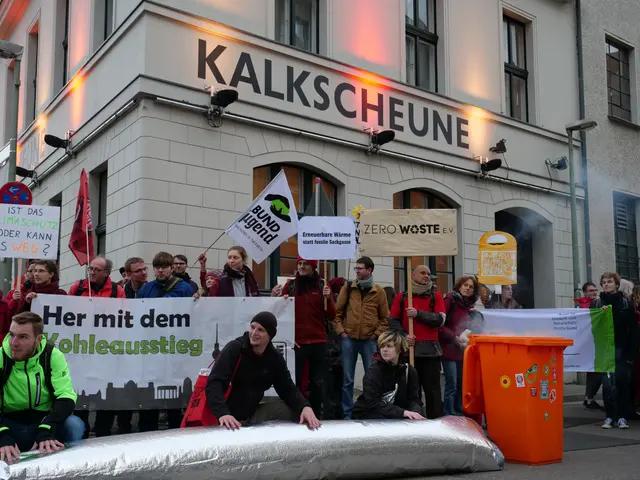Power station magnate Reiche endorses plans for gas-fired facilities in the southern regions of Germany
In a bid to secure electricity supply during periods of renewable energy shortage, particularly in southern Germany, the German coalition government (CDU, CSU, SPD) is planning to develop up to 20 gigawatts of new gas-fired power plants by 2030 [1][2]. These plants, which are expected to make up two-thirds of the total capacity, are part of a broader energy strategy that also includes the transformation of former nuclear sites into large battery storage facilities [4].
The federal government is currently in intensive talks with the EU Commission regarding the tender for the first 20 gigawatts in Germany [1]. State aid from the EU has been partially authorized, enabling significant subsidies to build these power plants, with Germany in advanced negotiations to secure approval for the remaining capacity [3].
However, a shift back to old technology instead of hydrogen-capable power plants could undermine the emerging hydrogen economy, according to Energy Minister Thekla Walker (Greens) [5]. Walker emphasizes that southern Germany needs not only new networks but also sufficient reserve capacities, which should be H2-ready and convertible to hydrogen as soon as possible.
Meanwhile, Federal Minister of Economics, Katherina Reiche (CDU), has announced a focus on establishing new gas power plants in southern Germany [2]. Reiche has expressed a desire to quickly bring these plants to fruition, with the first auction for new gas power plant capacity expected by late 2025 [3].
The debate over the rollout of these plants is not just about energy security and climate goals, but also about regional economic equity. Eastern German states, particularly the coal region of Lausitz (Lusatia), are concerned that prioritizing southern Germany (Bavaria, Baden-Württemberg) disadvantages their transition from coal [1][2]. The government has committed to ensuring eastern regions are not overlooked, recognizing their infrastructure and transformation challenges.
In an effort to address these concerns, the first relief measures, including reducing electricity tax, relieving grid fees, and the gas storage surcharge, will be decided by the federal cabinet before the summer break [1][2]. The focus is on lowering high electricity prices for companies to make them competitive.
Energy Minister Thekla Walker's demand for hydrogen-capable power plants is separate from the focus on new gas power plants in southern Germany announced by Katherina Reiche [5]. Walker's concern is that relying on gas longer than necessary carries uncalculated cost risks. She has called for a tender for modern hydrogen-capable power plants in Baden-Württemberg.
In summary, Germany's energy strategy is a delicate balance between energy security, climate goals, EU regulatory frameworks, and regional economic equity. The rollout of new gas power plants and related support measures is a significant step in this strategy, but the debate continues about the role of hydrogen-capable power plants in this transition.
- The economic and social policy discussion in Germany extends beyond energy security and climate goals, involving regional economic equity, particularly in the eastern states like Lausitz.
- Federal Minister of Economics, Katherina Reiche, is advocating for the development of new gas power plants in southern Germany, with a goal to make them hydrogen-capable in the future.
- Energy Minister Thekla Walker's approach to the energy strategy emphasizes the importance of modern hydrogen-capable power plants, asserting that relying excessively on gas could incur unnecessary financial risks and delay the transition towards a hydrogen economy.








